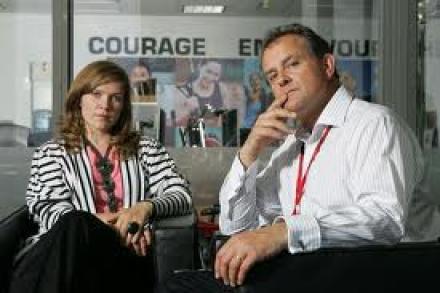
The second feature in our series on this year's Bafta nominees is a location report on the making of Twenty Twelve featuring interviews with co-stars Hugh Bonneville and Jessica Hynes first published in The Times last March. The show has already been garlanded with gongs elsewhere and is now deservedly in line for more. Olivia Colman and Jessica Hynes are both nominated for Best Female Performance in a Comedy Programme while Hugh Bonneville is nominated for Best Male Performance and the programme itself is nominated in the Best Sitcom Category. The results are announced on May 12. Golds all round might be a fitting honour.
Absolutely. Great. Yes. No. Absolutely.” Ian Fletcher, the head of the Olympic Deliverance Committee, is trying to unearth the positive side of another looming crisis, this time over Boris Johnson and the implementation of special lanes for his beloved bicycles — “Games lanes”. In other words, it is business as usual for the new series of the excruciatingly funny Twenty Twelve, the fictional send-up of the Olympic preparations now promoted from BBC Four to BBC Two, which I’m sure is nothing like the real thing, of course not.
We are in a large East London industrial estate building where Fletcher, played with sublimely straight-faced understatement by Hugh Bonneville, is concentrating on getting the lines of writer-director John Morton correct, repeating them over and over again. “Every ‘um’ and ‘er’ is scripted and we can all feel it when it isn’t coming out right,” he explains during a break. “There is something musical about hitting the tone and getting it right.” It is all a very long way from the trials and tribulations of Downton Abbey.
“John Morton’s mantra is ‘go faster and don’t smile’,” elaborates a friendly if nervy Bonneville later over a steaming polystyrene cup of tea in the catering bus. In Twenty Twelve everyone takes themselves deliciously seriously. The laughs come from the gold medal marathon-length streams of drivel that emerge from characters such as hopelessly earnest head of sustainability Kay Hope (Amelia Bullmore), head of contracts Nick Jowett (Vincent Franklin) and particularly head of brand Siobhan Sharpe, played by Jessica Hynes, who is also here today. Only Olivia Colman, as Ian Fletcher’s besotted PA Sally, retains a grip on reality.
After rehearsals the next scene is set up. It involves a kerfuffle caused by the Algerian delegation objecting when the “shared belief centre” does not face Mecca. A solution has to be found or the Algerians may go home. Fletcher wonders if the laundry room could be turned into a temporary mosque by building extra walls or a discreet minaret. Can the building be six-sided perhaps? His team might not have caused this problem, but they are pretty ineffective at solving it, particularly during a calamitous video conference with the Algerian delegate.
Olympic bureaucracy is a rich vein for comedy, as sticky situations rapidly become stickier. At one point, Fletcher accidentally coins the word “multiculturality” and because no one corrects him it goes viral. By the end of the episode even Sebastian Coe is using the word. Lord Coe is a good sport to take part, but maybe he thought it was a genuine documentary.
There have certainly been points where the line between fact and fiction has been thinner than the 100m finishing tape. In one storyline in the first series, the Olympic clock stopped on the day of its launch. In an exquisite moment of synchronicity the actual Olympic clock also stopped soon after.
The makers were hoping that they would also winkle a cameo out of Boris Johnson. This proved to be tricky, however, when London’s Mayor twigged that the programme might be aired during his re-election campaign. It might make him look like a jolly good chap if he indulged in a spot of ping-pong with Ian Fletcher for the cameras, but he might also have risked vote-losing egg on his face if the script stitched him up. Bonneville insists that the latter would never be Morton’s aim.
“I think that’s where this differs from The Thick of It,” he says. “That satirises the political machine; we are not setting out to satirise the Olympic machine. John [Morton] just wants to skewer the way we hide our incompetence by appearing confident.” Although the Mayor does not appear, he is certainly talked about. At one point, the head of infrastructure, Graham Hitchens (Karl Theobald), has to meet him and is suitably apprehensive: “What am I supposed to say to Boris? I don’t know any Latin.”
It is clear from watching the team working intensively throughout the long morning that filming is hard work. Bonneville says that onDownton Abbey they shoot five pages of script a day; here it is 22. “This is like the SAS of filming rather than a stately galleon.” But this has clearly helped the cast to bond.
“Jessica is brilliant,” Bonneville continues. “She perfectly captures the way Siobhan Sharpe is incompetent but utterly convinced of her own sureness.” At one point Sharpe, clearly not the sharpest tool in the box, tries to motivate the staff in her own distinctive style: “If we don’t whack this racoon we’re looking at a total crapfest.”
You do not have to have worked on an Olympic Deliverance Committee to recognise Siobhan “Hey, guys!” Sharpe. The steam of gushy, vacuous PR ordure that emanates from her every sentence has seeped into contemporary life. Bonneville agrees. “I’ve had a lot of feedback from people who say they watch the programme through their fingers because they’ve been in meetings like ours, whether in village halls or in the Millennium Dome. I think we’ve all seen people busking when dealing with data they do not understand, but want to convince their boss they are up to speed.”
Hynes arrives in the catering bus and, having grabbed a plate of tuna, speedily concurs that the power-dressed Sharpe is a universal archetype. “I’ve met a few Siobhans. I quite like them actually. You feel like you know what you are getting. Someone who always seems to come up smelling of roses, that’s her real skill. That’s what PR is: the boat’s sinking, let’s just put a positive spin on that.”
Hynes is a huge fan of Morton, who made his name with the spoof documentary People Like Us, which Hynes had a small part in before her breakthrough in the much-missed sitcom Spaced. People Like Uspre-dated The Office and was clearly influential, but for Hynes the mockumentary motherlode came earlier: “I think the real pioneer is Victoria Wood. She nailed it first with her fly-on-the-wall sketches.”
Twenty Twelve, however, pushes the format so hard it hurts. After these four programmes it will return again for another short run around the time of the Olympics. Then, sadly, the Deliverance Committee will be disbanded and Fletcher and co will be gone. Not necessarily, smiles Bonneville playfully: “After the success of the Olympics I’ve got great hopes that we can go on and sort out the Armed Forces and the NHS . . .” Absolutely. Great.





